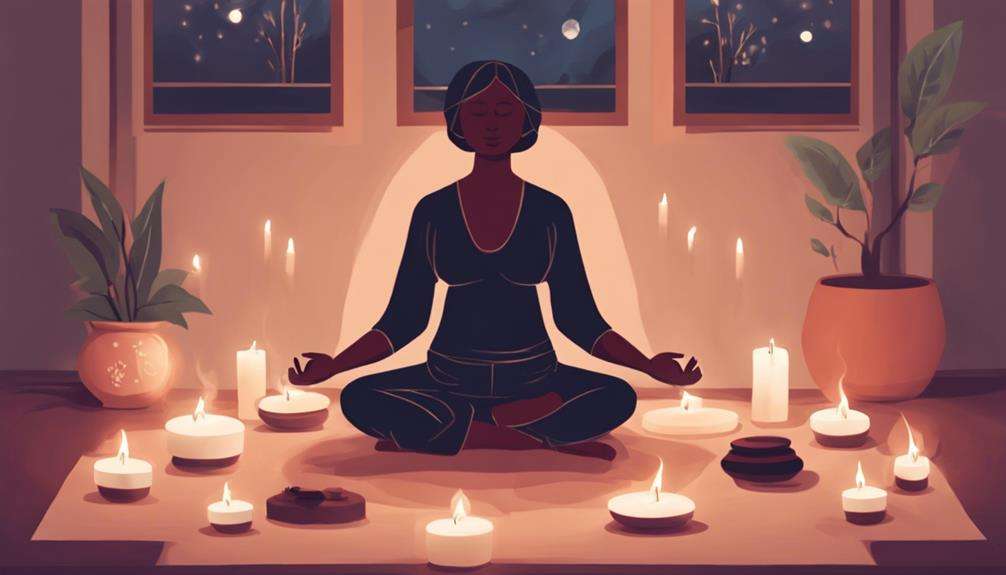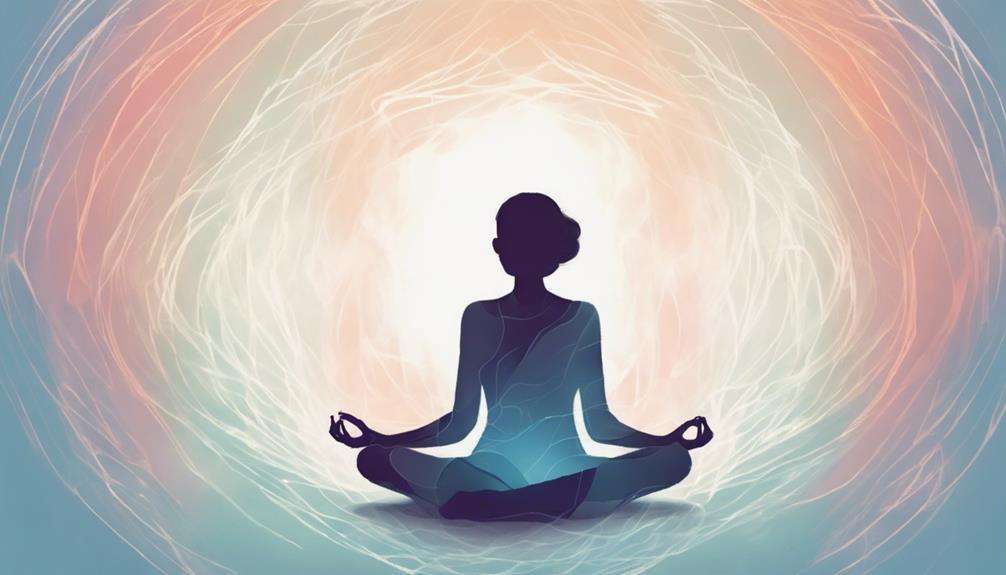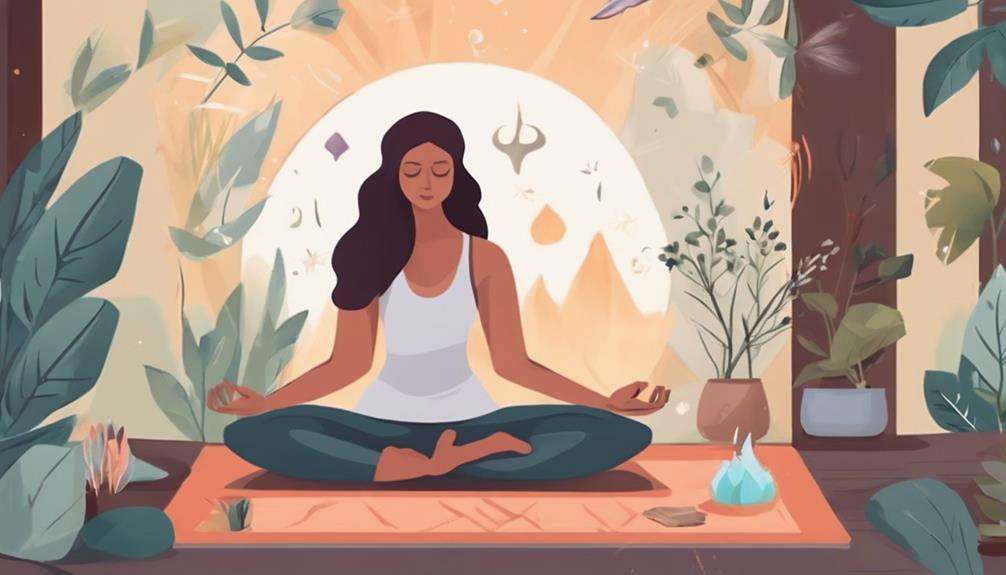Have you ever noticed how a simple walk in the park after work seems to melt away your stress?
Imagine if there were specific techniques you could incorporate into your daily routine that could offer that same calming effect on a more consistent basis.
By exploring various natural methods to reduce stress and anxiety, you might discover new ways to bring tranquility into your life.
Key Takeaways
- Yoga techniques like postures, breathing, and meditation reduce stress by targeting cortisol levels.
- Deep breathing exercises activate the body's relaxation response, lowering heart rate and improving emotional well-being.
- Mindfulness practices in yoga promote emotional balance and inner tranquility, enhancing overall well-being.
- Advanced techniques like Yoga Nidra and retreats offer profound relaxation, stress relief, and mental wellness benefits.
The Science Behind Yoga and Stress
Discover how yoga, a powerful mind-body practice, influences stress levels by targeting cortisol, the hormone linked to stress response. When you engage in yoga, you aren't just moving your body through poses; you're also working on your stress levels. Cortisol, often associated with stress, decreases as you practice yoga regularly. This reduction in cortisol levels is crucial because it helps modulate your body's stress response, leading to a calmer mind and body.
Moreover, yoga can enhance heart rate variability, which serves as an indicator of how well your body can handle stress. By improving heart rate variability, yoga helps you become more resilient to stressors that come your way. The combination of yoga postures, breathing techniques, and meditation activates your body's relaxation response, effectively reducing stress and anxiety.
Studies have also shown that incorporating yoga into your routine can elevate mood, alleviate symptoms of anxiety and depression, and boost overall well-being. By understanding the science behind yoga and stress, you can empower yourself to proactively manage your mental health.
How Yoga Helps Lower Stress Levels
Yoga offers a holistic approach to stress reduction by combining physical postures, breathing techniques, and meditation. These practices help you relax your body and mind, promoting a sense of calmness and well-being.
Through mindful movement and controlled breathing, yoga can be a powerful tool in lowering stress levels naturally.
Yoga for Relaxation
Embark on a journey towards relaxation and stress reduction through the holistic practice of yoga, integrating physical postures, breathing exercises, and meditation techniques.
Yoga for Relaxation:
- Holistic Approach: Yoga combines physical postures, breathing techniques, and meditation to promote relaxation and reduce stress levels effectively.
- Diverse Options: Various types of yoga like Hatha, Vinyasa, Yoga Nidra, and Restorative yoga offer diverse approaches to stress relief and mental well-being.
- Benefits: Practicing yoga enhances mental clarity, improves flexibility, and strengthens the body, contributing to stress reduction, calming the mind, reducing anxiety, and promoting inner peace.
Incorporating yoga into your routine can aid in managing stress, improving emotional balance, and fostering overall well-being. Start your yoga journey today for a calmer, more peaceful mind.
Breathing Techniques Benefits
By incorporating specific breathing techniques, yoga offers a powerful way to lower stress levels and promote overall well-being effectively. Deep breathing in yoga activates the body's relaxation response, reducing cortisol levels and promoting mental clarity.
Controlled breathing helps improve respiratory function, enhancing oxygen flow and contributing to stress reduction. Through activating the parasympathetic nervous system, yoga counteracts the effects of the sympathetic nervous system responsible for the body's stress response.
Breathing exercises like pranayama in yoga regulate emotions, improve focus, and alleviate anxiety symptoms by calming the mind and body. Regular practice of yoga not only fosters relaxation but also aids in stress reduction and anxiety relief, making it a beneficial tool for overall well-being.
Yoga Poses for Anxiety Relief
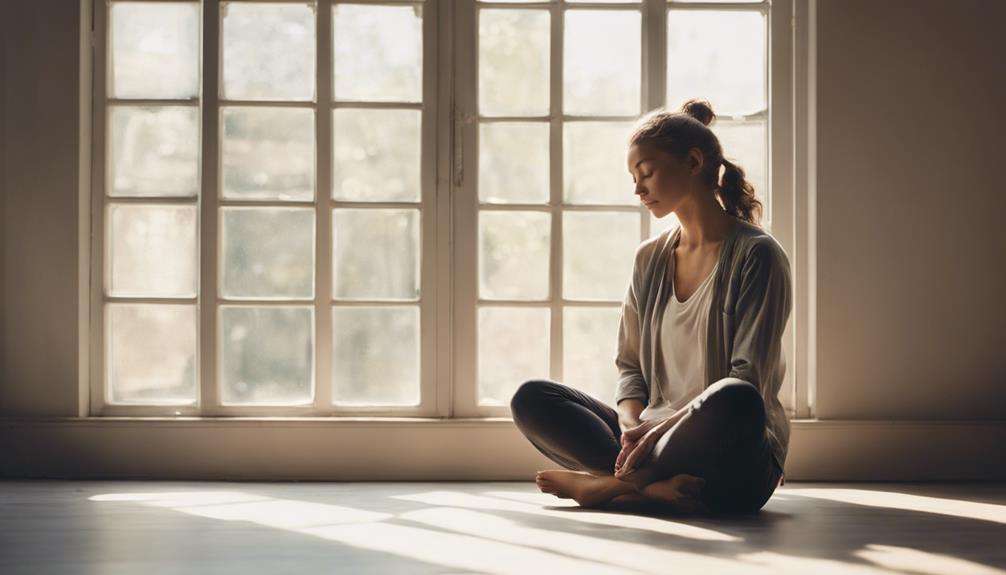
Are you looking for natural ways to reduce stress and anxiety?
Discover how calming yoga sequences, breathing exercises for relaxation, and mindfulness poses for stress can help alleviate anxiety symptoms and promote emotional well-being.
Incorporating these yoga poses into your daily routine may offer you a holistic approach to managing stress and finding peace within yourself.
Calming Yoga Sequences
To begin your journey towards reducing stress and anxiety naturally, explore calming yoga sequences designed specifically to alleviate anxiety and promote relaxation. Here are some yoga poses that can help you find peace and calm amidst the chaos:
- Engage in forward bends and gentle inversions to calm the mind and reduce stress levels.
- Practice restorative poses like Child's Pose and Legs-Up-the-Wall to release tension and promote deep relaxation.
- Try balancing poses such as Tree Pose and Warrior III to enhance focus, stability, and mental clarity, contributing to stress reduction and anxiety relief.
Incorporating these poses into your yoga routine can aid in stress relief, anxiety reduction, and overall well-being.
Breathing Exercises for Relaxation
Explore how incorporating breathing exercises into your yoga practice can effectively alleviate anxiety and promote relaxation, complementing the calming effects of yoga poses.
Deep breathing techniques, like Pranayama, activate the body's relaxation response, reducing stress levels. Techniques such as Nadi Shodhana help balance energy and decrease anxiety.
The 4-7-8 breathing method, a popular yoga practice, calms the nervous system by regulating breathing patterns. Integrate these exercises with yoga poses such as Child's Pose and Cat-Cow to enhance relaxation and reduce anxiety levels.
Mindfulness Poses for Stress
Mindfulness poses in yoga, such as Child's Pose (Balasana) and Corpse Pose (Savasana), are essential for promoting relaxation and reducing stress levels, providing effective relief for anxiety. When practicing these poses, you engage in a mind-body connection that aids in calming your nervous system and easing anxiety symptoms. Remember to focus on your breath and be present in each pose to maximize the benefits.
Additionally, incorporating breathing techniques like deep belly breathing can further enhance the relaxation response. By including yoga poses like Downward Facing Dog (Adho Mukha Svanasana) and Cat-Cow Pose (Marjaryasana) in your routine, you can release tension, calm your mind, and find relief from anxiety, contributing to a sense of calm and well-being.
Mindfulness Techniques in Yoga Practice
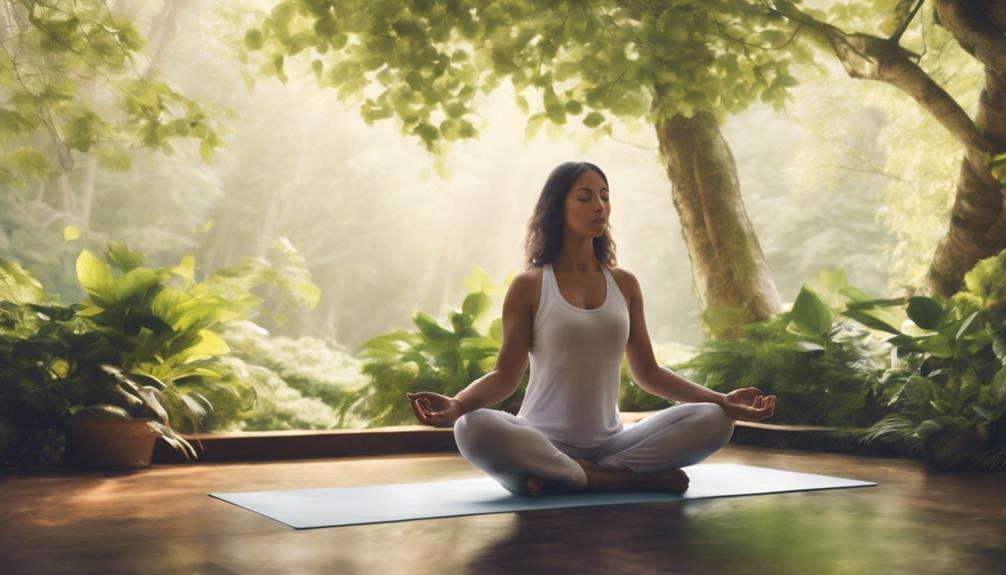
Immerse yourself in the practice of yoga with mindfulness techniques that focus on the present moment, promoting relaxation and reducing stress. Mindfulness in yoga involves paying attention to breath awareness and body sensations, which can help manage anxiety by grounding you in the present. By incorporating mindful movements like deliberate postures and slow transitions, yoga cultivates a sense of peace and calmness within you.
Engaging in mindfulness-based yoga practices doesn't just benefit the body but also the mind. These practices have been shown to improve emotional well-being by reducing negative thoughts and increasing self-awareness. Through mindfulness, yoga encourages acceptance of your thoughts and feelings, fostering inner balance and tranquility.
Breathwork for Calming the Mind
When it comes to calming your mind and reducing stress, breathwork can be a powerful tool. Deep breathing techniques have been shown to activate your body's relaxation response, helping you feel more at ease and less tense.
Deep Breathing Benefits
To cultivate a sense of calm and reduce stress naturally, incorporating deep breathing techniques into your daily routine can be incredibly beneficial. Deep breathing offers a range of advantages for your mental and physical well-being:
- Activates the body's relaxation response, reducing stress and anxiety.
- Increases oxygen flow and lowers heart rate, calming the mind and body.
- Reduces cortisol levels, the stress hormone, promoting overall well-being.
Mind-Body Connection
Engage in breathwork techniques like deep breathing and diaphragmatic breathing to harness the powerful mind-body connection for calming your mind and reducing stress and anxiety naturally. These practices trigger the body's relaxation response, leading to stress reduction, anxiety relief, and emotional balance.
Mindful breathing not only regulates the autonomic nervous system, decreasing heart rate and blood pressure, but also enhances mindfulness and mental health. Consistent breathwork can improve focus, emotional well-being, and symptoms of anxiety disorders.
Relaxation Through Breath
Harness the power of your breath to calm your mind and reduce stress naturally through effective breathwork techniques. Deep breathing techniques, a form of breathwork, activate the body's relaxation response, lowering heart rate and alleviating anxiety symptoms.
Controlled breathing patterns can decrease blood pressure, improving oxygen flow and enhancing focus. Methods like diaphragmatic breathing and box breathing provide simple yet powerful tools for managing stress and anxiety.
Incorporating breathwork into your daily routine can enhance emotional well-being, reduce tension, and support overall mental health. Take a moment to breathe deeply and consciously, allowing your breath to guide you towards relaxation and a sense of calmness in the midst of life's challenges.
Yoga for Relaxation and Anxiety Reduction
Yoga offers a holistic approach to relaxation and anxiety reduction by combining physical postures, breathing exercises, and meditation to promote overall well-being. Engaging in yoga can be a powerful tool for stress relief and anxiety reduction.
The practice of various yoga styles, such as Hatha, Vinyasa, Yoga Nidra, and Restorative yoga, provides diverse approaches to help you manage stress effectively. Through regular yoga sessions, you can enhance your flexibility, improve mental focus, and cultivate a sense of inner calmness. Poses like Child's Pose, Downward Facing Dog, and Corpse Pose are particularly beneficial for relaxation and reducing anxiety levels.
Incorporating yoga into your daily routine can have profound effects on your well-being by calming the mind, reducing stress, and promoting overall relaxation. Whether you're a beginner or experienced yogi, the combination of physical movements, controlled breathing, and mindfulness in yoga can help you find inner peace and alleviate anxiety naturally.
Start your journey to relaxation and anxiety reduction through the practice of yoga today.
Yoga Nidra for Stress Management
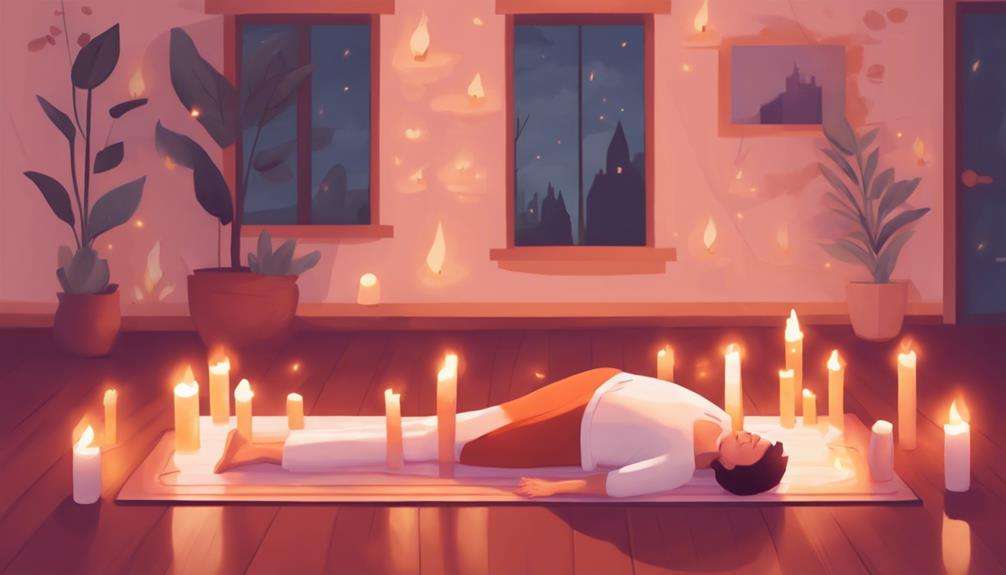
By exploring the practice of Yoga Nidra, you can effectively manage stress and promote relaxation through guided meditation techniques that induce deep emotional and physical relaxation. Yoga Nidra, a form of guided meditation, is a powerful tool for stress reduction and anxiety relief. Here's why it's beneficial:
- Deep Relaxation: Yoga Nidra involves a systematic method that leads to complete physical, mental, and emotional relaxation, helping you unwind and release tension.
- Sleep Improvement: Research indicates that regular practice of Yoga Nidra can enhance sleep quality, making it a valuable technique for those struggling with insomnia or sleep disturbances.
- Mindfulness Promotion: By calming the nervous system and promoting mindfulness, Yoga Nidra can alleviate symptoms of anxiety and contribute to overall well-being.
This practice is accessible to individuals of all ages and fitness levels, offering a versatile and natural approach to stress management. Embrace Yoga Nidra to experience its profound effects on your mental and physical health.
Yoga Retreats for Mental Wellness
Embark on rejuvenating journeys at yoga retreats, where immersive experiences in tranquil settings foster mental wellness and inner balance. These retreats offer a holistic approach to well-being, providing a space for deepening your yoga practice, exploring mindfulness, and learning relaxation techniques.
Imagine starting your day with daily yoga sessions, followed by peaceful meditation practices surrounded by the beauty of nature. Engaging in nature immersion activities can further enhance your connection to the present moment and promote a sense of calm.
In addition to these practices, yoga retreats often include stress management workshops to equip you with valuable tools for handling life's challenges. You can also enjoy nourishing meals, soothing spa treatments, and opportunities to connect with like-minded individuals on similar wellness journeys.
Yoga Community Support for Anxiety
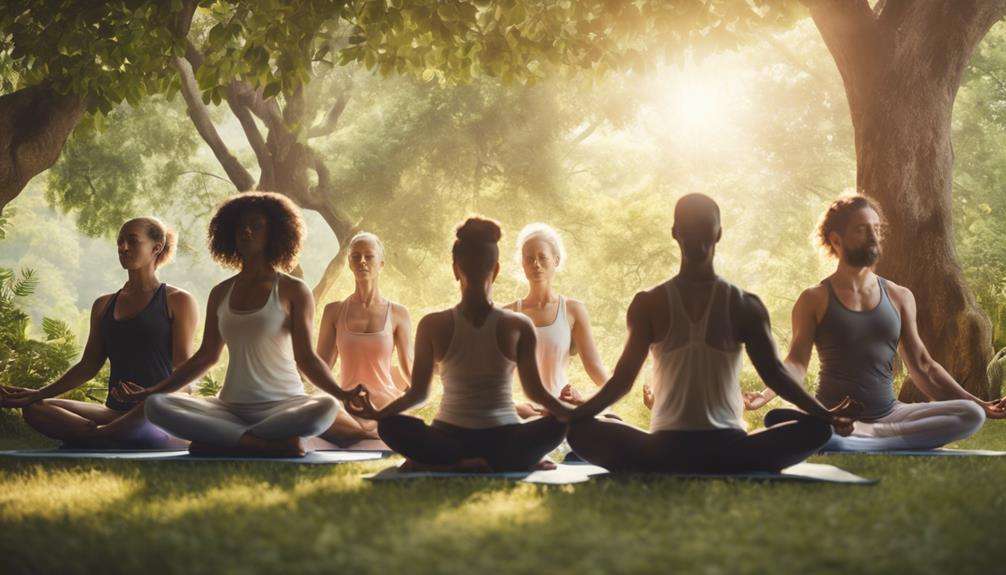
When seeking relief from anxiety, engaging with a supportive yoga community can provide valuable social connections and a sense of belonging that contribute to your overall well-being. Here are three ways yoga community support can help you in reducing stress and anxiety:
- Social Support: Being part of a yoga community offers a network of like-minded individuals who can provide encouragement, understanding, and a safe space to share your experiences, easing feelings of isolation and anxiety.
- Mindfulness Practices: Yoga classes often incorporate mindfulness techniques that promote present-moment awareness and help you manage anxiety symptoms effectively by focusing on the here and now.
- Enhanced Well-being: Regular yoga practice not only improves flexibility and relaxation but also boosts your overall well-being, fostering a positive mindset and reducing anxiety levels through physical movement and meditation.
Yoga Tips for Daily Stress Relief
Joining a yoga community can provide valuable social connections and support for reducing stress and anxiety naturally. Practicing yoga daily offers an effective way to alleviate stress and anxiety by promoting relaxation and enhancing mindfulness.
Various types of yoga, like Hatha, Vinyasa, and Restorative yoga, provide diverse approaches to stress relief through a combination of postures, breathing exercises, and meditation. These practices not only enhance flexibility but also contribute to improved mental well-being. Incorporating Yoga Nidra, a form of guided meditation, can further aid in achieving deep relaxation and reducing stress levels significantly.
Regular yoga sessions have been shown to lower cortisol levels, elevate mood, and enhance overall mental health. By committing to a daily yoga routine, you can experience the benefits of stress relief, relaxation, and improved mental well-being, ultimately leading to a healthier and more balanced lifestyle.
Frequently Asked Questions
What Is the 3 3 3 Rule Anxiety?
When anxiety strikes, the 3 3 3 Rule can help. Notice three things you see, hear, and feel. This grounding technique shifts focus, reduces anxiety, and promotes calm by engaging your senses.
How Can I Control My Fear and Anxiety Naturally?
To control fear and anxiety naturally, start with deep breathing and mindfulness meditation. Incorporate an exercise routine, herbal supplements, aromatherapy oils, yoga practice, nature walks, journal writing, and seek social support. These techniques promote relaxation and well-being.
What Calms Down Anxiety?
Take a deep breath, indulge in mindfulness meditation, try progressive relaxation. Nature walks, aromatherapy oils, yoga poses, herbal teas, coloring books, and music therapy all offer calm. Embrace these techniques to naturally ease stress and anxiety.
How Do You Deal With Severe Stress and Anxiety?
When dealing with severe stress and anxiety, focus on mindful breathing, progressive relaxation, nature walks, creative expression, guided imagery, physical exercise, herbal remedies, journaling therapy, and positive affirmations. These techniques help manage symptoms naturally and promote overall well-being.
Conclusion
In conclusion, incorporating yoga into your routine can naturally reduce stress and anxiety levels.
While some may feel hesitant to try yoga due to lack of flexibility or experience, remember that yoga is a personal practice and can be adapted to suit your individual needs.
With the science-backed benefits of yoga for mental well-being, taking that first step onto the mat could be the key to finding relief from stress and anxiety.
Give it a try and see the positive impact it can have on your overall health.

